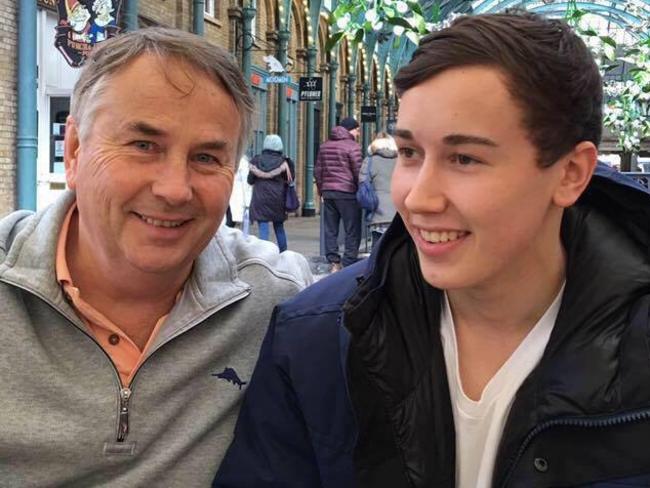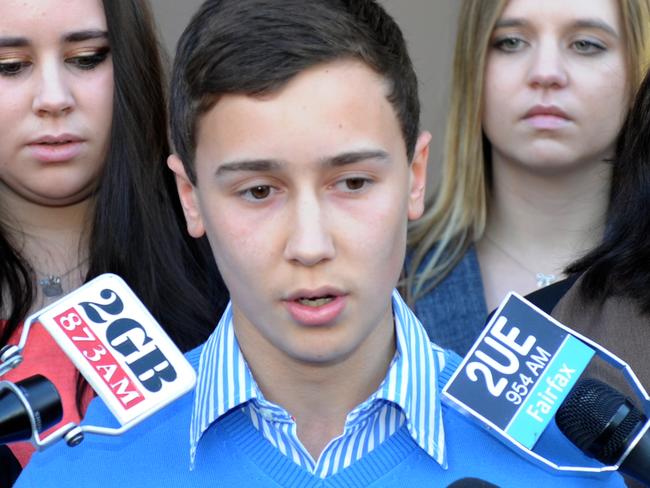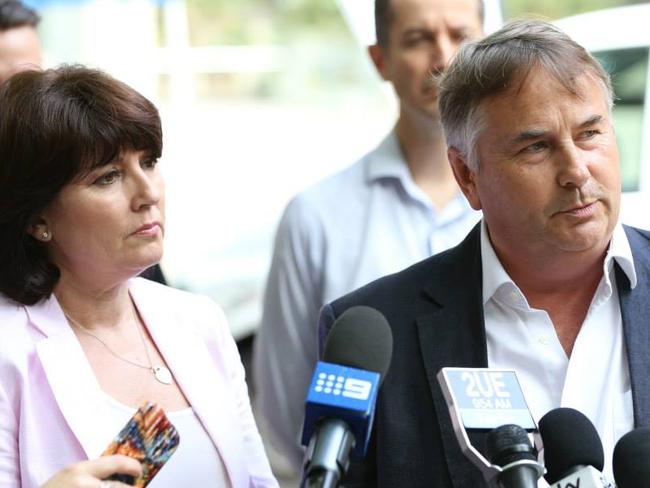Parents of Stuart Kelly reveal call they got from St Paul’s College after son’s death
STUART Kelly’s devastated parents have revealed a shocking phone call they received when their son Stuart died.
DAYS after Stuart Kelly died by suicide his parents got a disturbing call from St Paul’s College at Sydney University, where they believe the teenager had been exposed to “criminal” hazing rituals.
Ralph and Kathy Kelly said their son Stuart, who took his own life in 2016, became a different person overnight after attending the prestigious college.
Stuart’s death came less than five years after his older brother Thomas died when he was randomly punched while walking with his girlfriend in Kings Cross in July 2012. The family were later targeted in an apparent hate campaign over Sydney’s lockout laws, which they championed to prevent similar tragedies.
At Stuart’s funeral the Kellys were told their son had been held down by a number of boys and had alcohol poured down his throat at the college before he was able to break free, Mr Kelly said.
The parents are now calling for a coronial inquest into their son’s death.
When asked on 7.30 whether they had already tried to take steps to find out what happened on Stuart’s first night at St Paul’s, Mr Kelly said: “(Stuart) took his life on the Monday morning, on Thursday night I received a call from a very senior person at the college who passed on his condolences to our family and then said he had been contacted by someone in the media about Stuart not sleeping in the college that night.
“He also then said: ‘I have no interest in investigating what happened on the night of the 22nd of February 2016 when Stuart was at the college’, and with that he just hung up.”
Mr Kelly said the call left him in shock.
“As a dad who just lost his second son, I was not ruffled, I was in shock that anybody, (let alone) a senior person at the college, could make a phone call like that to a father who was in grief.”

The college now says it did investigate Mr Kelly’s death and found no substance to allegations he suffered something terrible at the college. It insists “there is not a culture of hazing” at St Paul’s, but rather a “very positive, warm and welcoming community”.
“The college is committed to the values of respect and dignity, including equality of respect for women and men, and actions inconsistent with these values are not tolerated,” it said in a statement.
Nevertheless, Sydney University said it would support a coronial inquest into Mr Kelly’s death.
As revealed by news.com.au yesterday, the Kellys believe something catastrophic happened to their son on the night he stayed at the college.
Until that night their son had been a bright and popular student but afterwards he changed dramatically.

The parents said Stuart asked them to pick him up from the Royal Prince Alfred Hospital Medical Centre the next day. They found him sitting in the gutter, with his head in his hands.
Stuart got in the back of the car and began sobbing, unable to speak. His parents had not seen him cry since the day his older brother’s life support had been turned off.
“He didn’t cry at the funeral. It was the first time I’d seen him cry since,” Mr Kelly said.
Kathy and Ralph became increasingly concerned and urged Stuart to tell them what had happened, but he wouldn’t reply.
When they arrived at the family home, Stuart told Ralph and Kathy that he was “never going back” to St Paul’s.
Those who knew him say he was a changed boy from that point on. He became withdrawn, he barely left his room and he refused to return to university. Five months later on Monday July 25, 2016, Stuart took his own life.
A 200-page report, released on Monday, reveals the long-running sexual humiliation and hazing rituals at Sydney University’s residential colleges with Mr Kelly saying the culture is “ingrained”.
“It has been going on for a very long time and I think we were oblivious or naive to what happens during Orientation Week,” he said.

“It’s well known by all the university that the culture is ingrained and can take many, many years to transition, but it’s definitely not acceptable, in many ways it’s criminal activity.”
The author of The Red Zone Report, Nina Funnell also revealed students who blew the whistle on their university colleges faced extreme backlash and ostracism for daring to speak out critically of their communities.
As part of the investigation, dozens of college students provided detailed information about college culture, but many students say they are too terrified to speak out under their own names fearing retaliation from their peers.
One student Justine Landis-Hanley described being bullied after she wrote a compelling article in 2016 for student publication Honi Soit about the culture of sexual harassment at the Usyd Colleges.
“One thing that oddly got to me the most was having my door defaced,” she said.
“At college, people often decorate each other’s doors. One of my best friends had stuck Snapchat pictures of me she had saved from last year all over my door as a cute surprise on my birthday. The day the article went out, I came home to find one of them missing. Every week onwards in semester one, one would be taken down. I found myself feeling incredibly low. On top of all the rest, I felt like scum.
“I knew I hadn’t done a bad thing, but I was made to feel like I did. I didn’t feel safe on campus. I didn’t feel safe at home.”
Universities last year vowed to overhaul how they responded to sexual assaults and harassment after a report by the Human Rights Commission in 2016 found 1.6 per cent of students from Australia’s 39 universities were sexually assaulted in the previous two years.
— With AAP
If you or someone you know is in need of crisis or suicide prevention support, please call Lifeline on 13 11 14 or visit www.lifeline.org.au/gethelp



